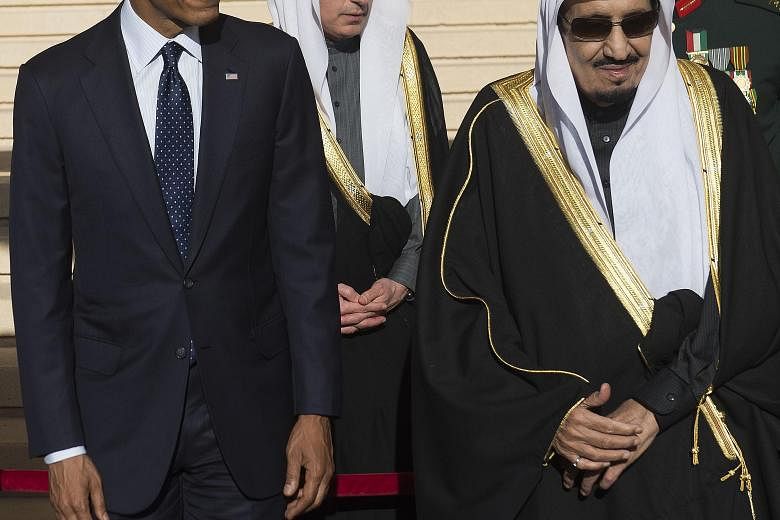RIYADH • Saudi Arabia's King Salman will meet United States President Barack Obama in Washington today to seek more support in efforts to counter Iran after it agreed to a nuclear deal that will ease some international pressure off Teheran.
Despite Saudi disappointment over Mr Obama's push for a nuclear deal with Iran and his lack of direct action against President Bashar al-Assad in Syria, the US role in Riyadh's war in Yemen shows that Washington remains the kingdom's core strategic partner.
"The relationship is entering a new phase. It is still a partnership, but Saudi Arabia is becoming more independent. And I think the Americans like that. They are not objecting to our active foreign policy, but cooperating with us on that front," said Mr Jamal Khashoggi, who heads al-Arab News Channel.
The relationship, a mainstay of the security balance in the Middle East, has seen some turbulence since Riyadh faulted what it saw as Mr Obama's withdrawal from the region, and a perceived tilt towards Iran since the 2011 Arab uprisings.
Since King Salman took power in January, he has abandoned Riyadh's traditional reliance on Washington to do the heavy lifting in Middle East security. Instead, he has embarked on a war in Yemen and boosted support for rebels against Mr Assad in Syria.
These moves show both Riyadh's increasing sense of independence and willingness to work with regional allies instead of Washington. They also indicate a more transactional approach to relations with the US.
Unlike at some earlier points in the relationship, cooperation now appears to be limited, either to instances where interests directly overlap, or to support in one area in exchange for support in another.
Mr Obama has been keen for Washington's allies to take on a larger role in regional security issues as part of his efforts to reduce US involvement in the many messy conflicts in the Middle East.
Riyadh is convinced that Iran is bent on achieving regional hegemony through proxy militia in Lebanon, Syria, Iraq and Yemen, thereby destabilising the entire region and undermining the kingdom's own stability. Washington, while critical of Iran's regional role, does not see it in such dire terms.
The Saudis fear that, by relieving sanctions on Iran, the nuclear deal will give Teheran more money and political freedom to back hardliners such as Hizbollah in Lebanon and Iraq's Shi'ite militias, as well as allies such as Yemen's Houthis.
"Saudi Arabia is way more concerned about current regional matters - not the hypothetical threat from an Iranian bomb. Washington should not get free support for the deal unless it commits more to current Saudi concerns in the region," said Mr Khashoggi.
REUTERS

